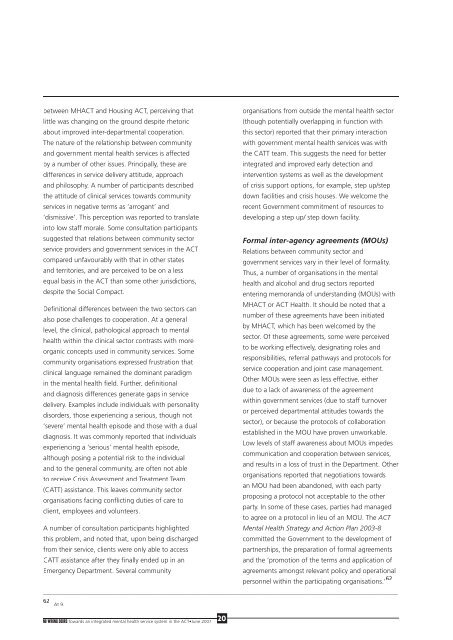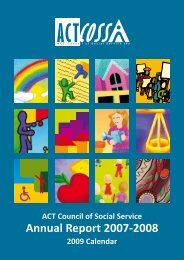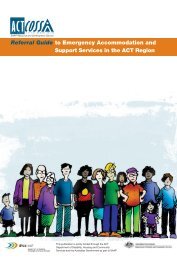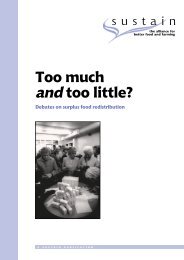actcoss text final.indd - ACT Council of Social Service
actcoss text final.indd - ACT Council of Social Service
actcoss text final.indd - ACT Council of Social Service
Create successful ePaper yourself
Turn your PDF publications into a flip-book with our unique Google optimized e-Paper software.
etween MH<strong>ACT</strong> and Housing <strong>ACT</strong>, perceiving that<br />
little was changing on the ground despite rhetoric<br />
about improved inter-departmental cooperation.<br />
The nature <strong>of</strong> the relationship between community<br />
and government mental health services is affected<br />
by a number <strong>of</strong> other issues. Principally, these are<br />
differences in service delivery attitude, approach<br />
and philosophy. A number <strong>of</strong> participants described<br />
the attitude <strong>of</strong> clinical services towards community<br />
services in negative terms as ‘arrogant’ and<br />
‘dismissive’. This perception was reported to translate<br />
into low staff morale. Some consultation participants<br />
suggested that relations between community sector<br />
service providers and government services in the <strong>ACT</strong><br />
compared unfavourably with that in other states<br />
and territories, and are perceived to be on a less<br />
equal basis in the <strong>ACT</strong> than some other jurisdictions,<br />
despite the <strong>Social</strong> Compact.<br />
Definitional differences between the two sectors can<br />
also pose challenges to cooperation. At a general<br />
level, the clinical, pathological approach to mental<br />
health within the clinical sector contrasts with more<br />
organic concepts used in community services. Some<br />
community organisations expressed frustration that<br />
clinical language remained the dominant paradigm<br />
in the mental health field. Further, definitional<br />
and diagnosis differences generate gaps in service<br />
delivery. Examples include individuals with personality<br />
disorders, those experiencing a serious, though not<br />
‘severe’ mental health episode and those with a dual<br />
diagnosis. It was commonly reported that individuals<br />
experiencing a ‘serious’ mental health episode,<br />
although posing a potential risk to the individual<br />
and to the general community, are <strong>of</strong>ten not able<br />
to receive Crisis Assessment and Treatment Team<br />
(CATT) assistance. This leaves community sector<br />
organisations facing conflicting duties <strong>of</strong> care to<br />
client, employees and volunteers.<br />
A number <strong>of</strong> consultation participants highlighted<br />
this problem, and noted that, upon being discharged<br />
from their service, clients were only able to access<br />
CATT assistance after they <strong>final</strong>ly ended up in an<br />
Emergency Department. Several community<br />
organisations from outside the mental health sector<br />
(though potentially overlapping in function with<br />
this sector) reported that their primary interaction<br />
with government mental health services was with<br />
the CATT team. This suggests the need for better<br />
integrated and improved early detection and<br />
intervention systems as well as the development<br />
<strong>of</strong> crisis support options, for example, step up/step<br />
down facilities and crisis houses. We welcome the<br />
recent Government commitment <strong>of</strong> resources to<br />
developing a step up/ step down facility.<br />
Formal inter-agency agreements (MOUs)<br />
Relations between community sector and<br />
government services vary in their level <strong>of</strong> formality.<br />
Thus, a number <strong>of</strong> organisations in the mental<br />
health and alcohol and drug sectors reported<br />
entering memoranda <strong>of</strong> understanding (MOUs) with<br />
MH<strong>ACT</strong> or <strong>ACT</strong> Health. It should be noted that a<br />
number <strong>of</strong> these agreements have been initiated<br />
by MH<strong>ACT</strong>, which has been welcomed by the<br />
sector. Of these agreements, some were perceived<br />
to be working effectively, designating roles and<br />
responsibilities, referral pathways and protocols for<br />
service cooperation and joint case management.<br />
Other MOUs were seen as less effective, either<br />
due to a lack <strong>of</strong> awareness <strong>of</strong> the agreement<br />
within government services (due to staff turnover<br />
or perceived departmental attitudes towards the<br />
sector), or because the protocols <strong>of</strong> collaboration<br />
established in the MOU have proven unworkable.<br />
Low levels <strong>of</strong> staff awareness about MOUs impedes<br />
communication and cooperation between services,<br />
and results in a loss <strong>of</strong> trust in the Department. Other<br />
organisations reported that negotiations towards<br />
an MOU had been abandoned, with each party<br />
proposing a protocol not acceptable to the other<br />
party. In some <strong>of</strong> these cases, parties had managed<br />
to agree on a protocol in lieu <strong>of</strong> an MOU. The <strong>ACT</strong><br />
Mental Health Strategy and Action Plan 2003-8<br />
committed the Government to the development <strong>of</strong><br />
partnerships, the preparation <strong>of</strong> formal agreements<br />
and the ‘promotion <strong>of</strong> the terms and application <strong>of</strong><br />
agreements amongst relevant policy and operational<br />
personnel within the participating organisations.’ 62<br />
___________________________________________________________________________________________________________________________<br />
62 At 9.<br />
NO WRONG DOORS Towards an integrated mental health service system in the <strong>ACT</strong>•June 2007<br />
20













